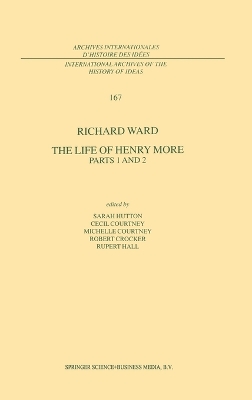International Archives of the History of Ideas / Archives Internationales d'Histoire des Idees
1 primary work
Book 167
The Cambridge Platonist, Henry More (1614-1687), was a dominant figure on the 17th-century intellectual scene. His life spanned both the political revolutions of the English Civil War and its aftermath and the intellectual revolution in 17th-century science and philosophy. More was highly regarded in his own day as a metaphysician, although the combination of receptivity to the new (such as his admiration of Galileo, Descartes and Boyle) and defence of traditional thinking (notably his belief in witchcraft) makes him a difficult figure to assess today. The heterodoxy of his theological views notwithstanding, More was an important spokesman for moderation within the Anglican Church after the Restoration, and a key figure in the Latitudinarian movement. This text is the only biographical account of him by one of his contemporaries. The almost hagiographical tone is ample testimony to the high regard in which More was held by his admirers. Ward's "Life" is an important document of intellectual and cultural history which testifies to the continuing impact of More's ideas in the Enlightenment.
Among other topics, Ward's biography registers the impact of Quakerism in the late-17th century and includes important details about More's "heroine pupil", Anne Conway. The present edition prints both the only modern edition of the printed part of Ward's account first published in 1710, together with the manuscript Account of More's writings.
Among other topics, Ward's biography registers the impact of Quakerism in the late-17th century and includes important details about More's "heroine pupil", Anne Conway. The present edition prints both the only modern edition of the printed part of Ward's account first published in 1710, together with the manuscript Account of More's writings.
